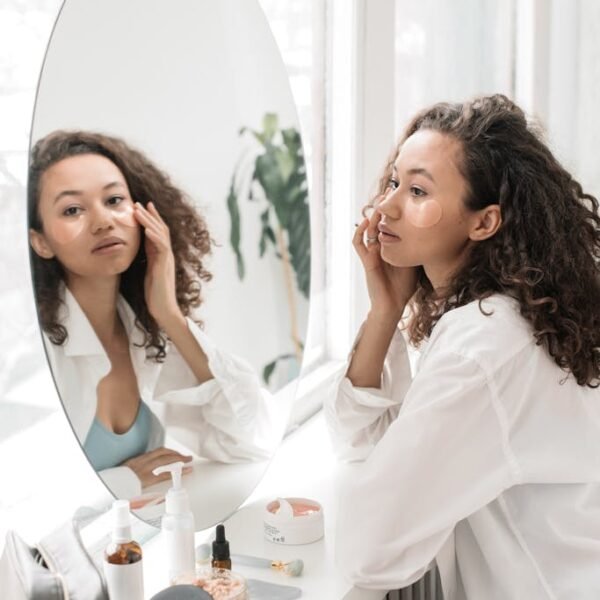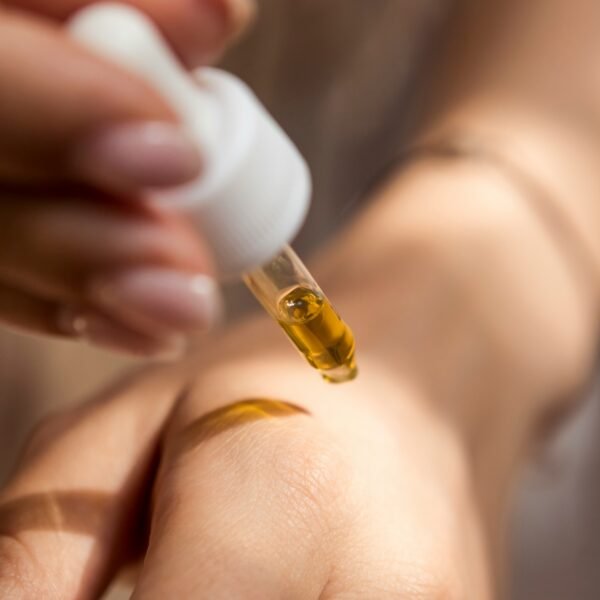Are you a big face-toucher? Have you ever wondered whether touching your face leads to acne? It’s a very common question among those of us striving for clear, radiant skin. But really, does touching your face cause acne? Keep on reading to find out.
There are numerous theories about what triggers breakouts, and one prevalent idea is that touching your face can cause acne. But is there any truth to this belief, or is it just another myth? Yes and No
Having faced my own fair share of acne battles, I know firsthand how tricky it can be to sort through the numerous skin care advice out there. Acne or Acne Vulgaris is a common skin condition that many of us have dealt with at some point in our lives.
This article will explore the science behind acne to understand the potential relationship between face-touching and acne. We’ll consider how touching the face may contribute to breakouts, considering individual skin sensitivities. In addition, we’ll provide practical tips for reducing face-touching habits to promote clearer skin.
Understanding what causes Acne:
Before we dive into the connection between face-touching and acne cause, let’s take a moment to understand what acne is. Acne, my friends, is a lot more complex than just a pesky pimple popping up on your face, and to have a better understanding, it is important to know the underlying cause.
Acne is a multifactorial skin condition characterized by the formation of pimples, blackheads, whiteheads, and cysts due to clogged pores and inflammation.
So, here’s the lowdown: our skin naturally produces oil called sebum. It’s supposed to keep our skin hydrated and protected, which is great. But sometimes, it goes into overdrive and produces too much oil. Too much sebum mixes with dead skin cells and other stuff, clogging our hair follicles (pores).
And guess what? Acnes bacteria love to hang out in these clogged pores. They cause inflammation and redness, leading to those pesky pimples we all dread, especially in acne-prone skin or oily skin type.
But that’s not all. Hormones also play a role, especially during puberty. Hormonal changes can ramp up sebum production, making our skin a prime target for acne.
So, in summary, the cause of your acne can be a result of excess sebum, clogged pores, bacteria, hormonal changes, and genetics. Understanding these factors is key to tackling acne and achieving clearer skin.
So, the next time you’re dealing with a stubborn pimple, remember that acne is more than just a surface-level issue. it’s about what’s going on, on a much deeper level.
The Role of Face Touching and Acne:
Now, let’s tackle a question that often pops up in skincare conversations: So, what’s the deal with face-touching and acne? While this link has been a discussion for ages, let’s uncover the truth behind this. Shall we?
Based on our understanding of how acne occurs in the first place, many experts have suggested that face-touching alone may not directly cause acne, but it can certainly contribute to the development of breakouts. How, you ask? Well, let’s break it down.
When we touch our faces with our hands, we’re not just transferring oils and dirt from our skin—we’re also introducing bacteria. Our hands are home to numerous bacteria, some of which can wreak havoc on our skin if given the chance.
So, every time we absentmindedly rest our chin on our hands or absentmindedly brush our hair away from our face, we’re essentially inviting these bacteria to thrive on our skin.
But it’s not just about the bacteria—face-touching can also irritate the skin and disrupt its delicate balance. Repetitive friction and pressure from touching our faces can lead to inflammation and irritation, potentially exacerbating existing acne or triggering new breakouts. This is known as Acne Mechanica.
So, while face-touching isn’t solely responsible for acne, it certainly plays a role in the various factors that contribute to breakouts.
By being more mindful of our face-touching habits, we can help minimize the risk of acne flare-ups and promote clearer, healthier skin in the process.
The Impact of Touching your Face and Skin Health:
Let’s delve into the broader implications of face-touching for our skin health. While it may seem like a harmless habit, the reality is that it can have significant consequences for the overall health of our skin.
Frequent contact between our hands and face, particularly with dirty hands, can facilitate the transfer of bacteria and other harmful pathogens. This exchange increases the risk of infections and skin irritation, often resulting in visible signs like redness, inflammation, and the emergence of new acne.
Face-touching can disrupt the barrier of the skin. This barrier acts as a shield, guarding against environmental aggressors and maintaining optimal hydration levels. However, repeated face-touching can compromise this vital defense mechanism, rendering the skin more vulnerable to damage and inflammation.
But it’s not just about the physical consequences—there are psychological implications as well. Research suggests that habitual face-touching behaviors can lead to increased feelings of anxiety and times of stress, which can further exacerbate skin conditions of acne lesions.
Therefore, while the act of face-touching may seem trivial, it’s crucial to acknowledge its potential impact on skin health.

Practical Tips for Minimizing Face Touching:
Let’s delve into some actionable steps you can use to combat the habit of face-touching in order to promote a healthier skin:
- Keep your hands clean: Maintaining clean hands is the first step for preventing the spread of harmful bacteria and viruses. Make a habit of washing your hands thoroughly with soap and water, especially before touching your face, to minimize the risk of transferring pathogens to your skin. Also keep your cell phone clean, as it is always in contact with your hands.
- Practice Mindfulness: Pay attention to your face-touching habits throughout the day and make a conscious effort to avoid unnecessary contact.
- Keep Nails Short: Long nails can harbor dirt and bacteria, making them more likely to transfer harmful pathogens to your skin when you touch your face. it is a good idea to keep your nails short and well-trimmed, which can help reduce the risk of contamination
- Use Clean Tools: When applying skincare products or makeup, use clean applicators or makeup brushes instead of your fingers. The importance of using sterile tools is to prevent bacterial contamination of skincare products.
- Manage Stress: Stress can exacerbate face-touching behaviors, so incorporating stress-reduction techniques into your routine is key. Activities like meditation, yoga, and deep breathing exercises have been shown to promote relaxation and reduce stress levels, consequently curbing the urge to touch your face.
By incorporating these practical tips into your daily routine, you can minimize face-touching and promote healthier, clearer skin. Remember, small changes can make a big difference when it comes to skincare habits. So, let’s commit to taking better care of our skin by being mindful of our face-touching behaviors.
How to strike a healthy balance:
In this journey of navigating your face-touching habit and striving for a healthier skin, it’s essential to strike a balance between care and caution. While it’s crucial to be mindful of our bad habits, we shouldn’t let fear dictate our actions.
What are some of the best ways to strike this balance:
- Be Mindful, Not Obsessive: Being excessively worried about skin health can lead to heightened anxiety levels, which may ironically worsen skin issues. While it’s important to be mindful of our face-touching habits, we shouldn’t obsess over every touch or skin contact.
- Focus on Healthy Habits: Instead of fixating on the negatives, let’s shift our focus to cultivating healthy skincare habits. Focus on maintaining a consistent skincare routine, that includes cleansing, moisturizing, and sun protection, in maintaining healthy skin.
- Seek Professional Guidance: If you’re unsure about how to care for your skin or if concerned about specific issues, don’t hesitate to seek guidance from a dermatologist or healthcare provider for effective treatments.
- Practice Self-Compassion: Skincare journeys can be challenging, but it’s essential to be kind to ourselves along the way.
By adopting this balanced approach, we can care for our skin effectively while maintaining a healthy mindset.
Bottom Line
In summary, our exploration into how touching your face affects acne highlights the importance of being mindful and making informed choices in our skincare journey. When we understand how our actions can impact our skin, we feel more confident in managing our routines effectively.
However, it’s crucial to find a balance between being careful and being obsessive, so we don’t let worries take over. Skincare is a journey where we keep learning and improving, so it’s important to stay open to new ideas and methods.
Moving forward, let’s use what we’ve learned to make better choices every day, forming habits that keep our skin healthy and happy for a long time.
Do leave your questions or comments below!





Leave a Reply